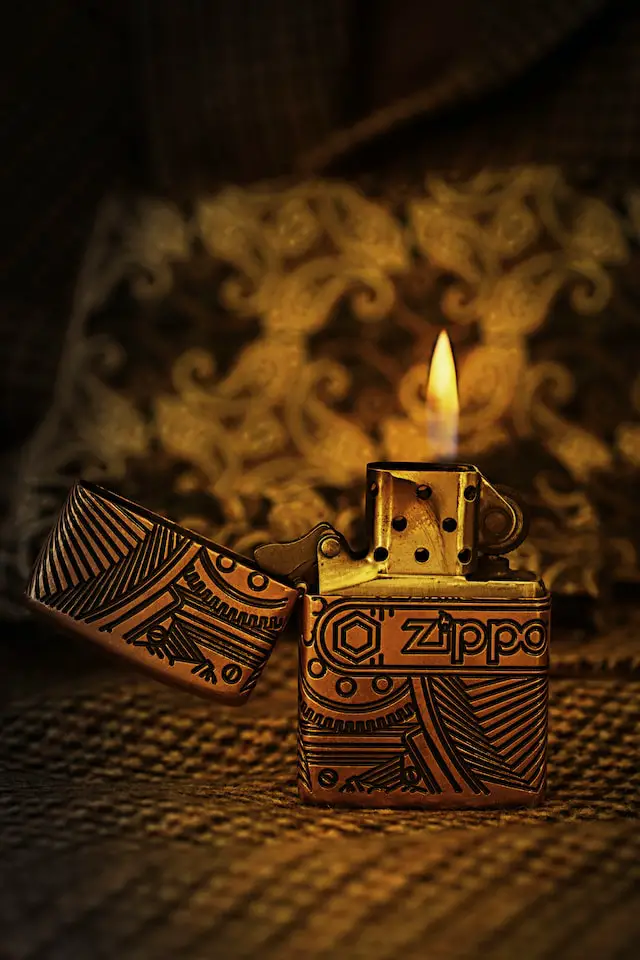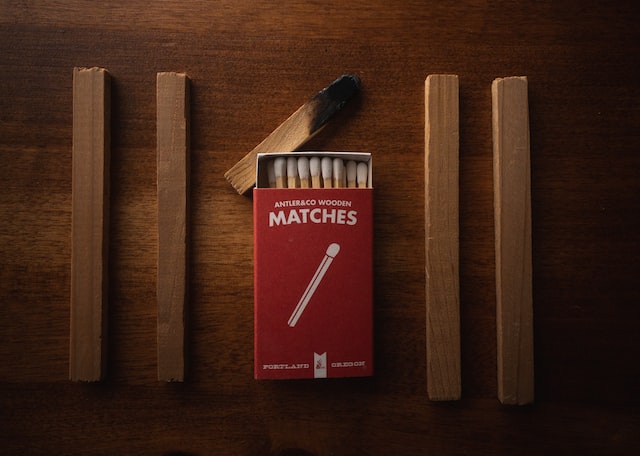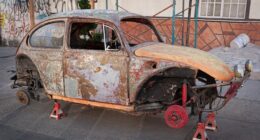Lighters tend to be more reliable when it comes to getting a flame quickly, as they often have a fuel source and an ignition mechanism. Matches, on the other hand, rely solely on friction for ignition which can make them less efficient in terms of speed and convenience.
The Different Types of Lighters
(Wioson JIANG on Unsplash)

Lighters come in all shapes and sizes, but they all have one thing in common: the ability to create a flame. This simple tool has been used for centuries to light fires, cigarettes, and cigars. But with so many different types of lighters on the market, it can be hard to know which one is right for you. Here is a rundown of the most popular types of lighters:
1. Flint Lighters: Flint lighters are the most basic type of lighter. They use a small flint stone to create a spark that ignites the fuel inside the lighter. Most flint lighters use butane as their fuel source, though some may also use propane or petroleum. Flint lighters are easy to use and relatively inexpensive, making them a good choice for those just starting oith cigar smoking.
2. Torch Lighters: Torch lighters are similar to flint lighters, but they produce a much hotter flame. This makes them ideal for lighting cigars, as the heat helps to evenly distribute the cigar’s flavour profile. Torch lighters also tend to be refillable, so you can use them over and over again.
3. Electric Lighters: Electric lighters work by heating u metal coil that ignites the fuel inside the lighter. These lighters are windproof and produce a consistent flame, making them ideal for outdoor activities like camping or hiking. Electric lighters typically use either butane or lithium-ion batteries
The Different Types of Matches
(Cobi Krumholz on Unsplash)

There are two main types of matches: safety matches and strike-anywhere matches. Safety matches are the most common type of match. They have a striking surface on the side of the box and can only be lit by being placed on this surface. Strike-anywhere matches can be lit on any rough surface.
Strike-anywhere matches are more dangerous than safety matches because they can easily be lit by accident. For this reason, they are not as common as safety matches.
The Pros and Cons of Each
Lighters and matches both have their pros and cons that should be considered before using them to light a fire. Lighters are generally much easier to use than matches, especially when it comes to lighting a cigarette. However, lighters can be quite dangerous if not used properly, as they can easily cause fires. Matches, on the other hand, are much safer to use but can be more difficult to light a fire with, particularly in windy conditions.
Which is better?
When it comes to choosing between lighter and matches, there are a few things to consider. If you need a flame that will last for a long time, then a lighter is the better choice. However, if you only need a small flame for a short pperiod then matches are the way to go.
What lasts longer matches or lighters?
Lighters and matches are both common ways to start a fire, but which one lasts longer? It depends on the type of lighter or match. Disposable lighters usually last for about 2,000 ignitions, while refillable lighters can last for up to 12,000 ignitions. Matches vary in longevity, with strike-anywhere matches typically lasting for around 200 strikes and safety matches lasting for up to 1,500 strikes. So, if you’re looking for a long-lasting fire starter, choose a refillable lighter or safety match.
Why do people use matches instead of lighters?
There are a few reasons people might choose to use matches over lighters. For one, matches are often cheaper than lighters. Additionally, matches can be easier to light in some situations, such as when it’s windy outside. Matches also tend to be more reliable than lighters; if a match is properly lit, it will almost always stay lit until it’s used up, whereas a lighter can sometimes run out of fuel or malfunction.
Can matches start a fire?
One of the most common questions we get asked is whether matches can start a fire. The answer is yes, they can! Matches are specifically designed to create a spark that will ignite a fuel source, such as paper or kindling. However, it’s important to note that not all matches are created equal.
There are two types of matches: strike-anywhere matches and safety matches. Strike-anywhere matches can be lit on any rough surface, while safety matches must be struck on a specially coated box or striker. While strike-anywhere matches are more convenient, they can also be more dangerous because they’re more likely to cause accidental fires.
If you’re using matches to start a fire, always use caution and make sure that the area around you is clear of flammable materials. Never leave a lit match unattended!
At what temperature will a lighter explode?
When a lighter is used, the fuel inside is burned to create heat. This heat then ignites the flammable material around the wick, which in turn creates the flame that we see when we light a lighter. Theuel inside a lighter is usually butane or propane.
Butane and propane have a very low flash point, meaning that they will ignite at relatively low temperatures. In fact, butane will ignite at temperatures as low as -11°F/-24°C, and propane will ignite at -156°F/-104°C.
So, if a lighter is exposed to extreme cold, the fuel inside can reach its flash point and cause the lighter to explode.
Is a match hotter than a lighter?
There are a few factors that come into play when deciding if a match is hotter than a lighter. The first is the type of fuel that is used. Matches are typically made with phosphorus, while lighters use butane or propane. Phosphorus ignites at a much higher temperature than butane or propane, making matches hotter.
Another factor to consider is the amount of oxygen that is present when the match is lit. Matches are designed to be used in open air, while lighters are often used in enclosed spaces. This means that there is less oxygen available to the match, which can make it burn hotter.
Finally, the size of the match also plays a role in how hot it burns. A larger match will have more fuel and will therefore burn hotter than a smaller one.
So, in general, matches are going to be hotter than lighters. However, there are some cases where a lighter may be able to produce a more intense flame than a match. It all depends on the factors mentioned above.
Why do matches smell so strong?
There are a few reasons why matches smell so strong. The first reason is that they are made of chemicals that produce a strong smell. The second reason is that when you strike a match, the chemicals in the head of the match interact with the oxygen in the air to create heat, light, and smoke. This reaction also produces a strong smell. Finally, when you hold a lit match close to your nose, you are smelling the combustion products of the match, which include carbon dioxide and water vapor.
Are matches wasteful?
Yes, matches are definitely wasteful. In fact, most people believe that using a match is the single most wasteful thing you can do with fire. The problem is that when you strike a match, the entire head is consumed in the process, leaving behind a small stub that is of no use.
If you’re looking for a more efficient way to light your fires, consider using a lighter instead. With a lighter, you only use the amount of fuel necessary to create a flame, so there is very little waste involved.
Does shaking a lighter help?
If you’re trying to start a fire, every little bit helps. That’s why some people believe that shaking a lighter will help them get a flame faster. The thinking goes that by shaking the lighter, you’re helping to spread the fuel around inside the chamber and increase the chances of getting a good flame.
However, there’s no real evidence that this actually works. In fact, it might even be counterproductive. By shaking the lighter, you could be causing the fuel to leak out or making it more difficult for the spark to ignite the gas. So, if you’re trying to get a fire going, it’s probably best to just stick with regular old matches.
https://www.youtube.com/watch?v=4C1jsrgnqRM
What to do with burnt matches?
If you’ve ever accidentally burnt your matches while trying to light a fire, you know it can be frustrating. But don’t worry, there are still plenty of uses for burnt matches. Here are a few ideas:

So, next time you accidentally burn your matches, don’t throw them out – put them to good use!
Featured Image By – Marek Szturc on Unsplash








